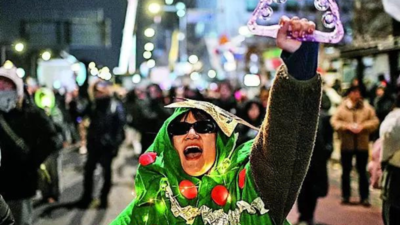
SEOUL: Eleven days ago, President
Yoon Suk Yeol
of
South Korea
made a bold power grab, putting the country under military rule for the first time in 45 years, citing frustration at the opposition stalling his agenda in parliament.
His
martial law
decree lasted only hours, and now he finds himself locked out of power: impeached and suspended by the National Assembly after a vote Saturday in which a dozen members of his party turned against him.
Yoon's popularity has plummeted during his two-and-a-half years in office, a term marked by deepening political polarisation, scandals involving his wife and a near-constant clash between his govt and the opposition-dominated parliament.
But the political turmoil and uncertainty unleashed by his short-lived declaration of martial law is far from over. Speaking soon after the vote, Yoon vowed to fight in court to regain his power, even as police and prosecutors closed in on him with a possible criminal charge of insurrection.
The fate of Yoon now rests in the hands of the country's
Constitutional Court
, which will decide - within the next six months - whether to reinstate or formally remove him. If he is formally removed, South Korea elects a new leader within two months.
During his suspension, PM Han Duck-soo, the No. 2 official in the govt hierarchy, has stepped in as interim leader. Because Han is not an elected official, he will lead South Korea with no real political heft at a time when the country faces challenges at home and abroad.

 2 hours ago
3
2 hours ago
3









